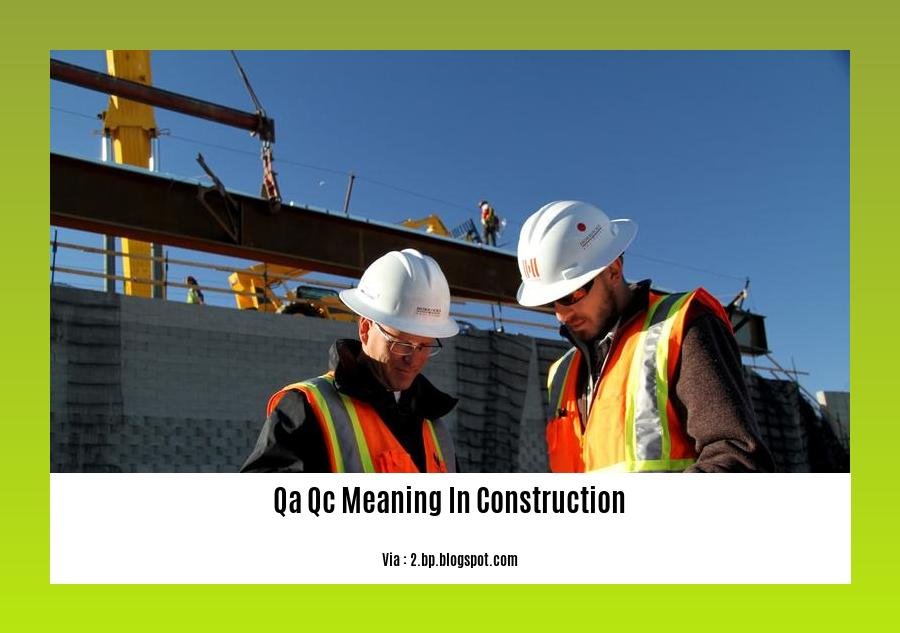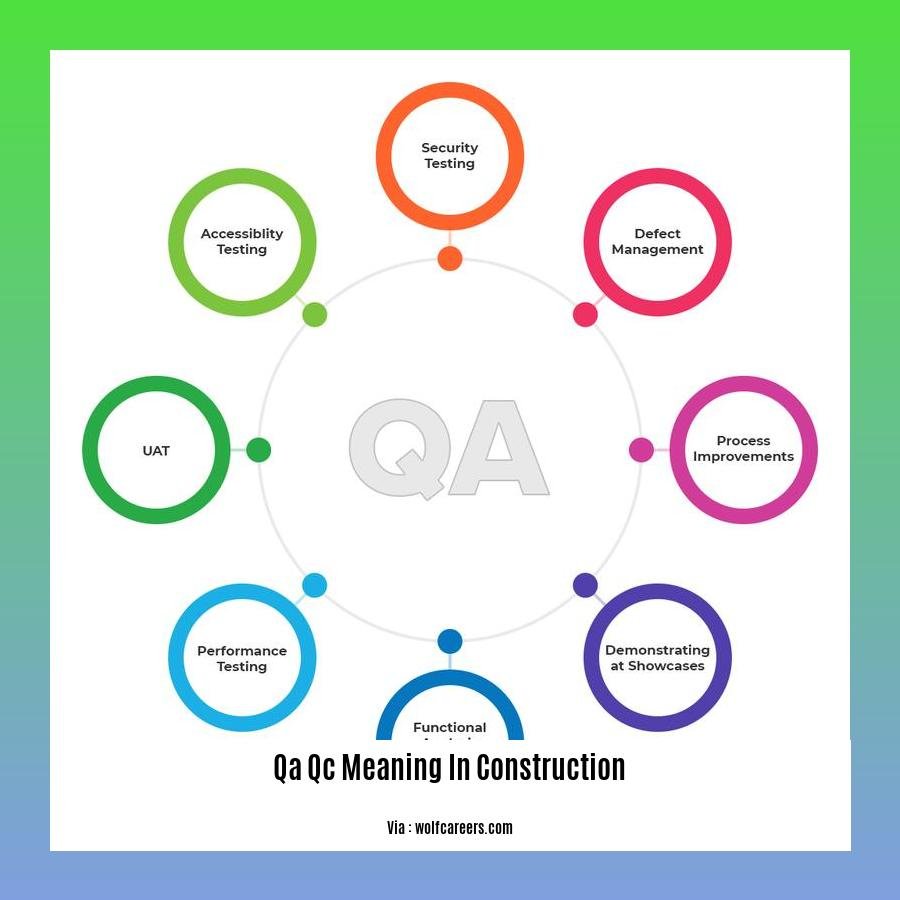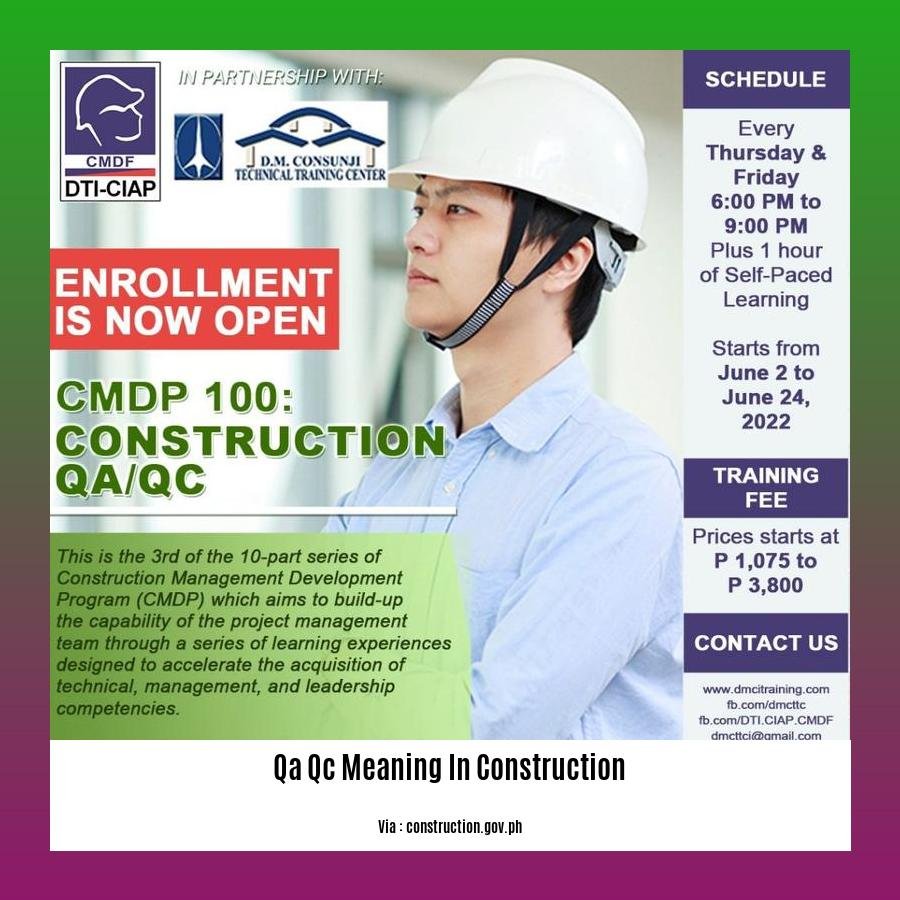Delve into the realm of QA/QC in construction with our comprehensive guide, “QA QC Meaning in Construction: Ensuring Project Quality and Compliance.” Learn the intricacies of these vital processes, their significance in maintaining project integrity, and the expertise required to effectively implement them.
Key Takeaways:
- QA/QC ensures project quality and compliance.
- QC evaluates project quality based on client demands.
- QA establishes quality standards and plans.
- QC teams perform tests and inspections to identify and resolve issues.
- QA responsibilities include guidance and documentation, while QC executes procedures.
- Pre-construction QA/QC involves setting quality standards and defining roles.
QA/QC Meaning in Construction: Pillars of Quality Management

In construction, ensuring project quality is paramount for safety, durability, and client satisfaction. QA/QC plays a critical role in this pursuit, ensuring projects align with established standards and meet contractual obligations.
Defining Quality Assurance (QA)
QA establishes the framework for quality control. It defines expected quality standards, conducts audits to monitor compliance, and provides guidance when issues arise. Responsibilities include:
- Developing quality plans
- Identifying quality risks
- Handling quality documentation
- Conducting assessments and reporting
Understanding Quality Control (QC)
QC is the hands-on aspect of quality management. It focuses on techniques used to verify that the construction meets the established quality standards. QC teams:
- Perform inspections and tests
- Monitor progress and identify deviations
- Implement corrective actions
- Maintain quality records
Differences in QA and QC Roles
While both QA and QC are crucial, their roles differ:
- QA: Focuses on setting quality standards, planning, and auditing
- QC: Executes specified procedures, conducts inspections, and takes corrective actions
QA and QC in the Construction Process
QA and QC play vital roles throughout the construction lifecycle:
- Pre-construction: QA establishes quality standards, while QC defines inspection protocols.
- Construction: QA provides guidance and documentation, while QC conducts inspections and testing.
- Post-construction: QA reviews documentation to ensure quality compliance, while QC conducts final inspections to verify the project meets specifications.
Conclusion
QA/QC are indispensable processes in construction, ensuring projects meet the highest standards of quality and safety. By understanding QA/QC meaning in construction, stakeholders can effectively implement these processes to deliver exceptional construction outcomes.
- Learn more about the responsibilities and qualifications of a QA/QC Construction personnel.
- Check out the necessary qualifications for a construction professional.
- Read the article about maintaining quality in building construction.
- Learn about implementing quality management in construction projects.
- Know more about developing a quality management system for your construction company.
Importance of QA/QC in Construction: Guaranteeing Project Quality and Compliance
The construction sector’s QA/QC (Quality Assurance/Quality Control) procedures serve as the cornerstones of project success. Ensuring that your construction endeavors align with established standards and requirements, QA/QC is paramount to delivering high-quality projects and maintaining public trust.
Understanding QA
QA is a proactive approach that anticipates and prevents quality issues. It involves developing plans, conducting audits, and setting standards to guarantee that projects meet contractual obligations.
Comprehending QC
QC, on the other hand, is reactive, identifying and rectifying construction deficiencies before they escalate. Inspections, testing, and documentation are integral aspects of QC, ensuring that projects adhere to specified quality levels.
Benefits of QA/QC
Implementing QA/QC in construction offers numerous advantages:
- Enhanced project quality and performance
- Increased public confidence and trust in construction projects
- Reduced risk of project failures and associated costs
- Improved project efficiency and cost-effectiveness
Challenges of QA/QC
While QA/QC is essential, it also poses challenges:
- Implementing and adhering to rigorous quality standards
- Coordinating multiple teams and subcontractors to ensure consistency
- Overcoming resource constraints and time limitations
Key Takeaways:
- QA ensures project quality meets specifications and expectations.
- QC identifies and corrects deficiencies, preventing major issues.
- QA/QC plans outline procedures for maintaining quality and mitigating risks.
- Effective QA/QC enhances project quality, reduces costs, and builds public trust.
- Implementing QA/QC requires careful planning, coordination, and resource allocation.
Citations:
- Quality Assurance and Quality Control in Construction
- The Role of QA/QC in Construction
[## Quality Control (CQ) in the Building Sector: Meaning, Purpose, and Process]
KeyTakeaways
- QualityAssurance (QA) and Quality Control (QC) are key processes for quality and safety in the building sector.
- QAC plans specific procedures to ensure project quality.
- QCC idents and solves construction project shortcomings before they become major issues.
QAC and QCC in the Building Sector
QAC
- Ensure the finished productt all requirements.
- Plans for Quality Assuranc
- Conduct Quality Assuranc
QCC
- Verifying building quality
- Conduct tests and assessments
- Identifying progress and finding issued
- Take corrective actions
Role of QAC and QCC in the Building Process
Pre-Construction (Preparation and Design):
- QAC executes quality processes
- QAC is part of quality team
- QAC follows quality standards
Construction (Execution):
- QCC plans for quality control
- QCC in action
- QCC measures and reports
Post-Construction (Closure and Handover):
- QCC conducts final quality check
- QCC conducts and reports final quality assessment
Conclusion
- QAC and QCC are critical processes for quality and safety in construction
- QAC’s meaning in construction
- QCC’s role in construction
- Leads to high-quality building projects
Related URL sources
- QAC in the Building Sector: A must-read for quality and safety in the building sector
- QCC in the Building Sector: The Ultimate Guide to Quality Control in the Building Sector
Challenges and Solutions in QA/QC
In construction, ensuring project quality and compliance is paramount, and the QA/QC processes play a vital role in achieving this.
Challenges
-
Implementing and maintaining rigorous quality standards: Establishing and enforcing high standards of construction quality can be challenging, especially when dealing with diverse materials, complex designs, and multiple stakeholders.
-
Coordinating and managing multiple teams and subcontractors: Coordinating the efforts of various teams and subcontractors to ensure adherence to quality standards can be complex, requiring effective communication, clear documentation, and regular monitoring.
Solutions
-
Establish clear quality plans and procedures: Develop comprehensive QA/QC plans that outline specific quality requirements, inspection criteria, and responsibilities for each stakeholder.
-
Foster communication and collaboration: Establish open communication channels and encourage active collaboration among team members, contractors, and supervisors to address quality issues promptly.
-
Conduct regular inspections and audits: Implement a rigorous inspection and audit schedule to monitor project progress, identify deviations from quality standards, and initiate corrective actions.
Key Takeaways:
- QA focuses on proactive measures to prevent defects, while QC focuses on identifying and correcting errors.
- Challenges in QA/QC include implementing quality standards and coordinating teams.
- Solutions include establishing clear plans, fostering communication, and conducting regular inspections.
- QA/QC is essential for ensuring project quality, compliance, and cost-effectiveness in construction.
Relevant URL Sources:
- Construction QA vs. QC: Definitions and Major Differences
- The and And Of QA/ QC – Construction Placements
FAQ

Q1: What is quality assurance (QA) in construction?
A1: Quality assurance (QA) in construction ensures that projects meet established standards, specifications, and contractual obligations. It involves proactive measures to prevent defects and maintain the highest standards of quality and compliance.
Q2: How does quality control (QC) differ from QA in construction?
A2: Quality control (QC) focuses on reactive measures to identify and correct any construction project deficiencies before they become significant problems. It involves conducting quality tests and inspections to ensure that the project meets client demands.
Q3: What are the responsibilities of QA/QC professionals in construction?
A3: QA/QC professionals in construction are responsible for developing and executing QA/QC plans, monitoring and assessing project progress against quality standards, conducting regular quality inspections and audits, and investigating and resolving quality-related issues.
Q4: What are the benefits of implementing QA/QC in construction?
A4: Implementing QA/QC in construction improves project quality and performance, enhances public confidence and trust, and lowers the risk of project failure and associated costs. It also helps identify and correct issues early on, preventing costly rework or repairs.
Q5: What are the challenges of implementing QA/QC in construction?
A5: Implementing QA/QC in construction can be challenging due to the need to maintain rigorous quality standards, coordinate and manage multiple teams and subcontractors, and adapt to changing project conditions.
– Quality Assurance (QA) and Quality Control (QC) in Construction: A Comprehensive Overview
Quality Assurance (QA) and Quality Control (QC) in Construction: A Comprehensive Guide
Key Takeaways:
- Definition of Quality Control (QC): Techniques to ensure projects meet client specifications.
- Challenges of QC: Coordinating stakeholders, identifying defects, and balancing cost/quality.
- Benefits of QC: Conformance to standards, reduced rework, and enhanced customer satisfaction.
- Tools for QC: Inspection checklists, testing equipment, quality audits.
- Improvement Tips for QC: Clear quality standards, empowered personnel, and quality control systems.
QA/QC Meaning in Construction: A Comprehensive Overview
In the realm of construction, quality is paramount. QA/QC stands as the cornerstone of ensuring that projects meet the highest standards of workmanship, safety, and efficiency.
QA (Quality Assurance) is the proactive approach to prevent defects and errors from occurring. It involves setting quality standards, training personnel, and implementing quality management systems.
QC (Quality Control) is the reactive aspect that verifies whether the desired quality levels are being met. It encompasses inspections, testing, and documentation to identify and address any deviations from specifications.
Together, QA/QC forms a robust system that safeguards the integrity of construction projects. By ensuring compliance with industry regulations, these practices minimize rework, delays, and costly mistakes.
Benefits of QA/QC:
- Ensures construction projects meet client requirements
- Protects the health and safety of occupants and the environment
- Minimizes costly defects and rework
- Enhances project timelines and cost efficiency
- Improves customer satisfaction and reputation
Tools for QA/QC:
- Inspection checklists
- Testing equipment
- Quality audits
- Software for quality management
- Training programs for personnel
Implementing QA/QC:
- Establish Clear Standards: Define quality requirements and specifications for the project.
- Train and Empower Personnel: Provide training and resources to ensure site personnel understand and follow quality protocols.
- Establish a Quality Management System: Implement procedures and processes to monitor and control quality throughout the project lifecycle.
- Conduct Regular Inspections and Testing: Verify conformance to specifications through regular inspections and testing.
- Document and Communicate: Maintain accurate records of inspections, testing results, and any corrective actions taken.
By embracing QA/QC principles, construction professionals can ensure the highest standards of quality, safety, and efficiency on their projects.
Discover the ins and outs of a QA QC Construction job description and learn about the essential qualifications for construction professionals. Explore the importance of quality in building construction and delve into the best practices of quality management in construction projects. Gain insights into quality management systems for construction companies and elevate your construction operations to new heights.
QA/QC Processes: Inspections, Audits, and Testing
In the realm of construction, ensuring quality is paramount. QA/QC Processes: Inspections, Audits, and Testing play a crucial role in safeguarding project integrity.
Inspections involve scrutinizing construction activities, materials, and equipment to identify potential defects or deviations from specifications. These meticulous examinations help prevent errors, ensuring compliance with standards and project requirements.
Audits, on the other hand, take a broader view. They assess the effectiveness of the QA/QC system itself, evaluating processes, documentation, and personnel qualifications. Audits help identify areas for improvement, strengthening the quality management framework.
Testing, an integral part of QA/QC, provides empirical evidence of material and component performance. Through rigorous testing, we can verify the adequacy of construction methods, materials, and workmanship. It enables early detection of potential issues, allowing for timely corrective action.
Key Takeaways:
- Inspections: Vigilant examination to identify construction defects or deviations from specifications.
- Audits: Evaluation of QA/QC system effectiveness, processes, documentation, and personnel qualifications.
- Testing: Empirical verification of material and component performance through rigorous assessments.
References:
- Implementing a Comprehensive QA/QC Plan
- QA/QC in Construction: Inspecting, Auditing, and Testing for Success
Role of QA/QC in Risk Management and Defect Prevention
Risk Management and Defect Prevention
In construction projects, implementing effective risk management strategies is crucial. QA/QC plays a vital role in identifying potential risks and defects early on, allowing for proactive measures to be taken. By conducting thorough inspections, tests, and audits, QA/QC professionals can pinpoint areas where risks lie and implement preventive actions to minimize the likelihood of defects.
Improved Safety and Durability
QA/QC practices prioritize safety and durability. By ensuring that materials, workmanship, and construction methods meet industry standards and project specifications, QA/QC helps to prevent accidents and structural failures. This not only protects the well-being of workers and occupants but also ensures that the structure will withstand the test of time.
Cost Savings
Defects can lead to costly repairs, rework, and delays. QA/QC helps to avoid these expenses by identifying and correcting errors before they become major issues. This proactive approach saves time, money, and headaches for all stakeholders involved.
Key Takeaways:
- QA/QC reduces project risks by identifying potential hazards and implementing preventive measures.
- QA/QC enhances safety and durability by ensuring compliance with industry standards.
- QA/QC minimizes defects, which leads to cost savings and project efficiency.
Citations:
- The Role of QA/QC in Construction Risk Management
- The Importance of QA/QC in Defect Prevention in Construction
Benefits of Effective QA/QC in Construction
Benefits
Effective QA/QC in construction offers numerous benefits that can significantly enhance project outcomes and ensure long-term success. By implementing stringent QA/QC measures, construction professionals can:
- Minimize Errors and Defects: QA/QC processes help identify and address potential issues frühzeitig, preventing costly errors and defects that could compromise the structural integrity and functionality of the project.
- Enhance Safety: By ensuring adherence to safety protocols and standards, QA/QC measures prioritize the well-being of construction personnel and users, minimizing the risk of accidents and injuries.
- Improve Quality and Durability: QA/QC practices focus on delivering high-quality construction that meets or exceeds industry standards. This ensures that structures are built to last, reducing maintenance costs and ensuring the longevity of the project.
- Increase Customer Satisfaction: By consistently meeting project specifications and customer requirements, effective QA/QC measures enhance customer satisfaction and build trust, leading to positive feedback and repeat business.
- Optimize Resource Allocation: QA/QC processes help identify inefficiencies and propose corrective actions, optimizing resource utilization and preventing waste. This can lead to significant cost savings and improved project timelines.
- Protect Company Reputation: A strong commitment to QA/QC demonstrates a company’s dedication to quality and professionalism, enhancing its reputation and attracting new clients who value reliable construction services.
- Ensure Project Success: By proactively addressing potential challenges and implementing effective quality control measures, QA/QC plays a pivotal role in ensuring the successful completion of construction projects, meeting project goals, and achieving desired outcomes.
Key Takeaways:
- QA/QC minimizes errors and defects, enhancing safety and durability.
- Effective QA/QC measures improve quality, increase customer satisfaction, and optimize resource allocation.
- By protecting company reputation and ensuring project success, QA/QC adds value to construction projects.
Citation:
- What is QA and QC in Construction
- QA and QC in Construction
FAQ
Q1: What is the difference between QA and QC in construction?
A1: QA (Quality Assurance) focuses on preventing defects and ensuring quality requirements are met, while QC (Quality Control) involves inspecting and measuring products or services to identify and correct errors.
Q2: Why is QA/QC important in construction?
A2: QA/QC helps ensure that construction projects meet industry standards and regulations, reduces costly errors, enhances safety, improves customer satisfaction, optimizes resource allocation, and protects company reputation.
Q3: What are the key components of a QA/QC plan in construction?
A3: A QA/QC plan outlines the specific procedures, responsibilities, and quality standards that must be followed throughout the construction process.
Q4: How does QA/QC help prevent defects in construction?
A4: QA/QC measures, such as inspections, testing, and audits, help identify potential defects and non-conformances early on, allowing for timely correction and prevention of more costly issues later in the project.
Q5: What are the benefits of implementing QA/QC in construction projects?
A5: Implementing QA/QC practices leads to improved project quality, reduced rework and errors, enhanced safety, increased customer satisfaction, and optimized resource utilization.
- Stove Backsplash Design: Ideas to Elevate Your Kitchen Style - December 26, 2025
- Backsplash For Cooktop: Stylish Ideas To Protect and Enhance - December 25, 2025
- Stove Backsplash Ideas: Find Your Perfect Kitchen Style - December 24, 2025










